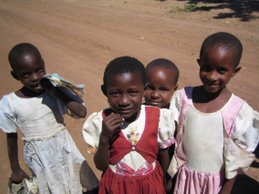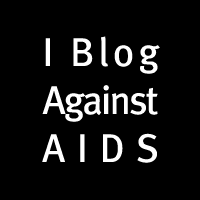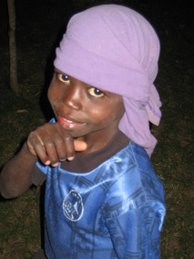Mwanza -> Missungwe -> Ngudu -> Mwanza
I left Mwanza very early and arrived in Missungwe at 9 o'clock yesterday to find all the dispensaries (local doctor's offices) closed. After walking around the village for a bit Patrice and I finally found someone that worked at the dispensary, who said he would go off and find his boss and open the office up. While we were waiting for him to come back, we hopped on bicycle dalla-dalla's to the hospital in search of their VCT (voluntary testing and counseling) unit. We were told again that as it was a Sunday, the VCT unit was closed, but the doctor on duty talked to us about HIV in the area and estimated that about 1/3 of the people in Missungwe were HIV positive and as yet, there was no provision of ARV drugs in the district. Anyone who's t-cell count was low enough that they needed ARVs would either need to pile into a dalla-dalla for over an hour to reach Mwanza (not very feasible in the advance stages of HIV disease [AIDS] when diarrohea is often present) or have to pay for the medications themselves at retail price (not an option for the vast majority of the very poor district). When we returned to the dispensary, we talked to the head of the lab who had come into work especially to talk to us. He told us that the local dispensaries (which due to the sparsely distributed population are usually the only health facilities most people in Tanzania can access) are not able to talk to people about HIV, test for HIV, or prescribe ARVs.
The bus to Ngudu was the biggest vehicle I've traveled in yet, and easily the most frightening! By the time we arrived in Ngudu I was worn out by all the travel, but still had many people to meet. The first person I spoke to was the District officer in charge of AIDS, who told me that the only ARV medications available to people in the district were a single dose used to prevent mother to child transmission, there weren't any drugs available for ongoing treatment of AIDS patients. Again, people that needed ARVs had to travel to Mwanza (2.5 hours away on the fastest route) or buy them themselves. I spent just over 24 hours in Ngudu and met the chief executive officer, his secretary, the district commissioner, the executive officer of the hospital, the chief medical officer, the head of the VCT programme, a few patients, and a group of traditional healers.
I was primarily interested in access to treatment and in an area where treatment options weren't available it was not necessary for me to talk to patients. Despite me saying this several times, the doctors insisted that I speak to two female patients. One of the patients was in the final stages of the disease: she was suffering from diarrhea and abdominal pains, had lessions all over her body and under the sheet was clearly little more than bones. Through my translaters and the doctors I couldn't work out if she actually knew about her HIV status, or if it was just her father that knew. The second lady I talked to was a mother of eight children and came to the hospital complaining of abdominal pains, the doctor told me she did not know she was HIV positive and hadn't gone through counseling yet. It made me extremely uncomfortable to talk to both of these women who were suffering a great deal and know that I knew more about their medical status than they did.
It was a whirlwind visit and one that left me feeling really exhausted. I came back to Mwanza feeling very worn out and depressed.








No comments:
Post a Comment